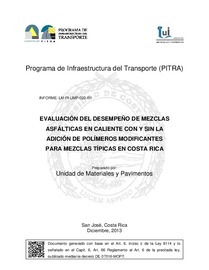| dc.contributor.author | Vargas Nordcbeck, Adriana | |
| dc.contributor.author | Aguiar Moya, José Pablo | |
| dc.contributor.author | Loría Salazar, Luis Guillermo | |
| dc.date.accessioned | 2017-05-04T21:08:36Z | |
| dc.date.available | 2017-05-04T21:08:36Z | |
| dc.date.issued | 2013-12 | |
| dc.identifier.uri | https://www.lanamme.ucr.ac.cr/repositorio/handle/50625112500/197 | |
| dc.description.abstract | El uso de asfaltos modificados es cada vez más común en el mundo. El porcentaje de mezcla asfáltica producida con asfaltos modificados ha crecido en los últimos años debido a todas las ventajas que la modificación del asfalto puede brindar a las mezclas, en cuanto a factores ambientales y económicos, mejora del desempeño, incremento de la vida útil y hasta para cumplimiento de especificaciones contractuales. El LanammeUCR se dio a la tarea de evaluar cuatro mezclas asfálticas de granulometría densa: dos clasificaciones finas y las otras dos clasificadas como gruesas, con dos tamaños nominales máximos distintos (12,5mm y 9,5mm) que son consideradas mezclas típicas en el país, mediante varios ensayos de desempeño. Los ensayos utilizados fueron: resistencia retenida a la tensión diametral, resistencia a la deformación permanente mediante al Analizador de Pavimentos Asfálticos (APA), resistencia al agrietamiento mediante el ensayo de fatiga a flexotracción y módulo dinámico de la mezcla. Para todos los casos, el modificante utilizado fue un polímero SBR (Estireno-Butadieno-Caucho), que actualmente se está utilizando en algunos proyectos a nivel nacional. Los resultados de este estudio mostraron que la modificación del asfalto con polímeros puede utilizarse en mezclas típicas de Costa Rica para mejorar el desempeño de los pavimentos asfálticos. Sin embargo, la magnitud del beneficio de la modificación también dependerá de otros factores, como el tamaño máximo nominal del agregado y el tipo de granulometría de la mezcla. | es |
| dc.description.abstract | The use of modified asphalt is increasingly common in the world. The percentage of asphalt mix produced with modified asphalt has grown in recent years due to all the advantages that the modification of the asphalt can give to the mixtures, as far as environmental and economic factors, improvement of the performance, increase of the useful life and compliance with contractual specifications. The LanammeUCR was given the task of evaluating four asphalt mixtures of dense granulometry: two fine classifications and the other two classified as coarse, with two different maximum nominal sizes (12.5mm and 9.5mm) which are considered as typical mixtures in the country, through several performance tests. The tests used were: retained resistance to diametrical tension, resistance to permanent deformation by the Asphalt Pavement Analyzer (APA), cracking resistance by flexotraction fatigue test and dynamic modulus of the mixture. For all cases, the modifier used was a SBR (Styrene-Butadiene-Rubber) polymer, which is currently being used in some projects nationwide. The results of this study showed that the modification of asphalt with polymers can be used in mixtures typical of Costa Rica to improve the performance of asphalt pavements. However, the magnitude of the benefit of the modification will also depend on other factors, such as the maximum nominal size of the aggregate and the type of granulometry of the mixture. | es |
| dc.language.iso | es | es |
| dc.publisher | Laboratorio Nacional de Materiales y Modelos Estructurales (LanammeUCR) | es |
| dc.relation.ispartofseries | LM-PI-UMP-020-R1 | |
| dc.subject | PITRA | es |
| dc.subject | Mezcla asfáltica modificada | es |
| dc.subject | polímero | es |
| dc.subject | SBR | es |
| dc.subject | Modified asphalt mixture | es |
| dc.subject | polymer | es |
| dc.title | EVALUACIÓN DEL DESEMPEÑO DE MEZCLAS ASFÁLTICAS EN CALIENTE CON Y SIN LA ADICIÓN DE POLÍMEROS MODIFICANTES PARA MEZCLAS TÍPICAS EN COSTA RICA | es |
| dc.type | informe técnico | es |
| dc.description.procedence | UCR::Vicerrectoría de Investigación::Unidades de Investigación::Ingeniería::LanammeUCR | es |

